
How the late Joost van der Westhuizen turned Springbok pride into something eternal
Mould-breaking South Africa scrum-half is remembered as much for his playing genius as for his tenacious fight against the crippling disease that eventually claimed his life
The breathtaking tenacity of Joost van der Westhuizen on the field was matched only by that the World Cup-winning former Springbok and Hong Kong Sevens star displayed in his long fight against the debilitating disease that eventually claimed his life earlier this year.
Van der Westhuizen died of motor neurone disease (MND) in February.
Apart from being an integral part of the team that made history when South Africa won the 1995 Rugby World Cup, Van der Westhuizen played in the inaugural Rugby World Cup Sevens in Hong Kong in 1997. He was also a fixture on the Hong Kong speaking circuit.
“I had the choice to live or die. I could sit and home and die, or I can live my life,” Van der Westhuizen told The Telegraph.
Watch: Joost van der Westhuizen’s interview
“I have a platform and now I am using it to help anybody with MND. Now I am living my life the way I want to help others.”
Van der Westhuizen’s story will live on not only because of his rugby career, but for the legacy he left for MND sufferers, which he elevated into something eternal, and players of his era remember him on and off the pitch.
Chester Williams, Springbok great
When I think of Joost, not only do I think of the 1995 Rugby World Cup. I remember him in Hong Kong for the Rugby World Cup Sevens in 1997.
Even though we’d had that stunning victory [over the All Blacks] in Ellis Park, we never thought we were going to get that far in Hong Kong. New Zealand and Fiji dominated at that time. Yet, unbelievably, we got into the final and with a few minutes to go, [Waisale] Serevi came in and wove his magic. The rest is history and they beat us 24-21.
Joost was steely. He was feisty. He was determined and completely focused. He would look at every game we lost and analyse what went wrong to better it next time. He never gave up.
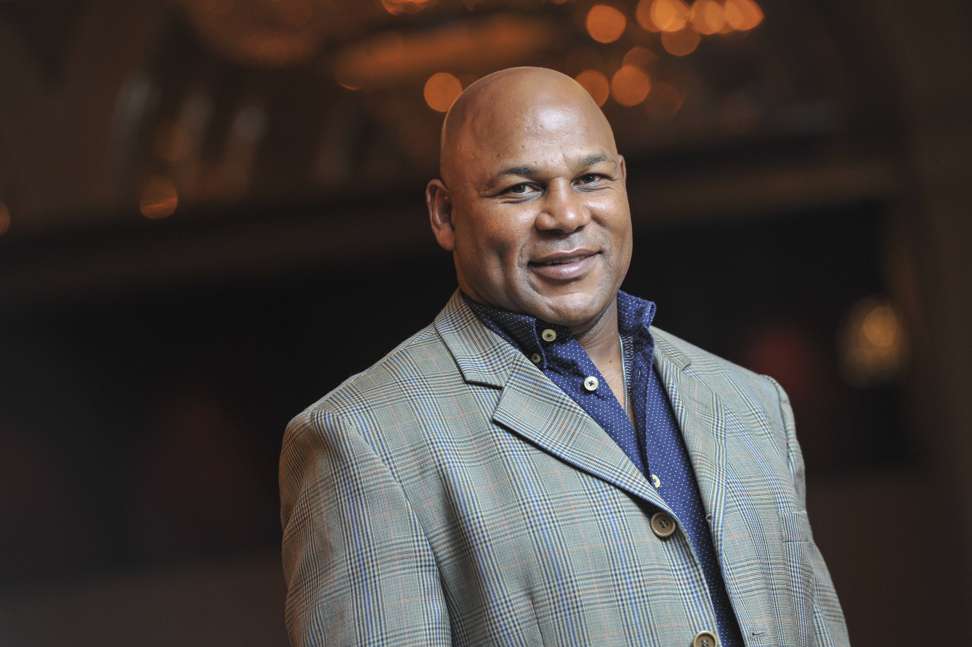
This was one of the great strengths he bought to his illness. This is what his teammates loved about him, and so did all of South Africa.
When he was diagnosed with MND he had not long separated from his wife [well-known South African singer Amor Vittone]. Their two young children were their priority. They never divorced.
It’s amazing how well they and his whole family coped. Joost’s mother was also a rock, as was his brother, Peter. When people could not understand what Joost was saying, Peter would lip-read and eased everyone into understanding that Joost was still the same person on the inside.
Peter showed great patience, love, dedication and understanding. Everyone around Joost did.
Because of his dedication to creating awareness and seeking donations to help research the disease, he was seldom out of the headlines.
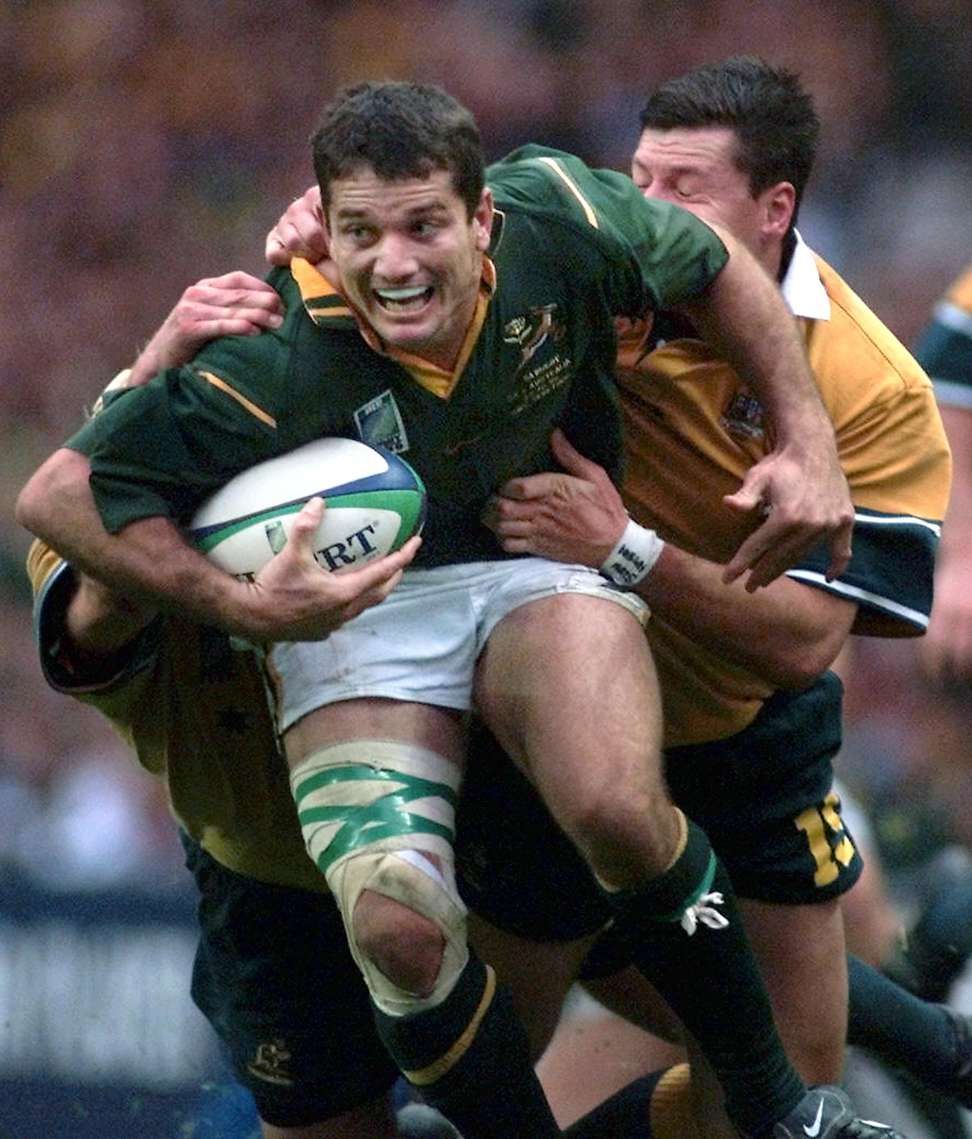
In South Africa, his final days and passing dominated the media for two weeks.
He never wanted to be treated as anything other than a normal, everyday man. His coffin and funeral reflected that. And everyone was welcome at the funeral. That was him. He was not one for airs and graces. The story of his passing around the world also celebrated his incredible and way too short life.
He’s left a huge lasting legacy for MND in South Africa.
Joost had been to Hong Kong as a public speaker. He was a great Bok spokesperson and for MND as he was very straightforward.
We say that he is with Madiba [Nelson Mandela] now, and they are both working their magic for us all.
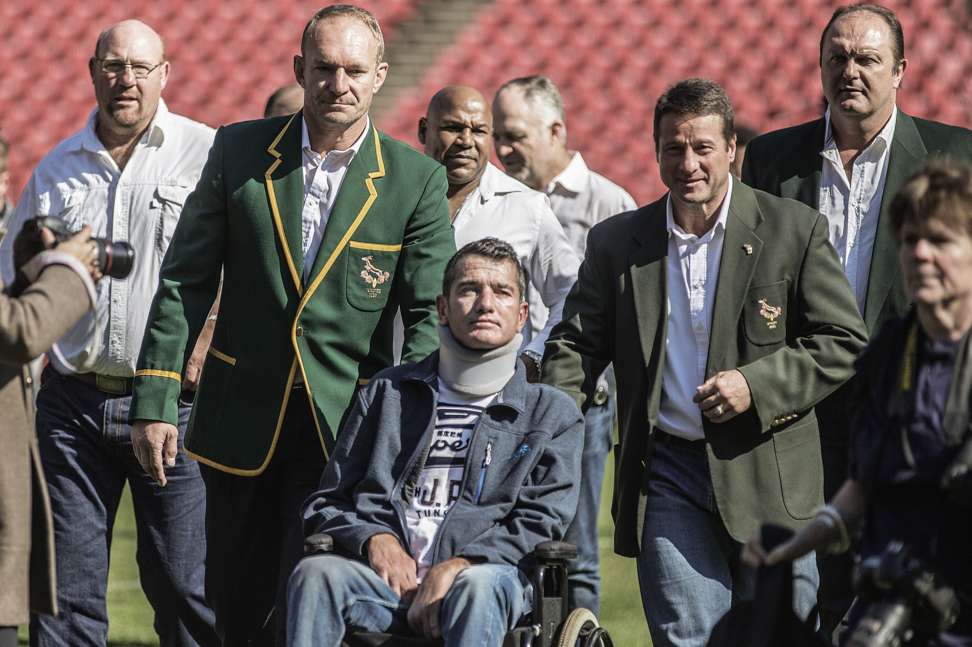
Chris Gordon, former Hong Kong player
Joost was one of my all-time favourite players – super fit, extravagantly skilled, fast and quite tall for a scrum half. But the attribute that really stood out for me was his competitiveness.
We were fortunate enough to play against Joost in the 1997 World Cup Sevens. He was at the top of his game then – the premier number nine in world rugby, having recently won the Rugby World Cup .
The Boks had a sensational team for the World Cup Sevens, with guys like Bobby Skinstad, Chester Williams and Andre Venter, and only narrowly lost the final that year to the Serevi-inspired Fiji.
I caught up with him a couple of times in Dubai when the MND had really taken hold. He used to go there quite regularly to raise the profile of the disease.
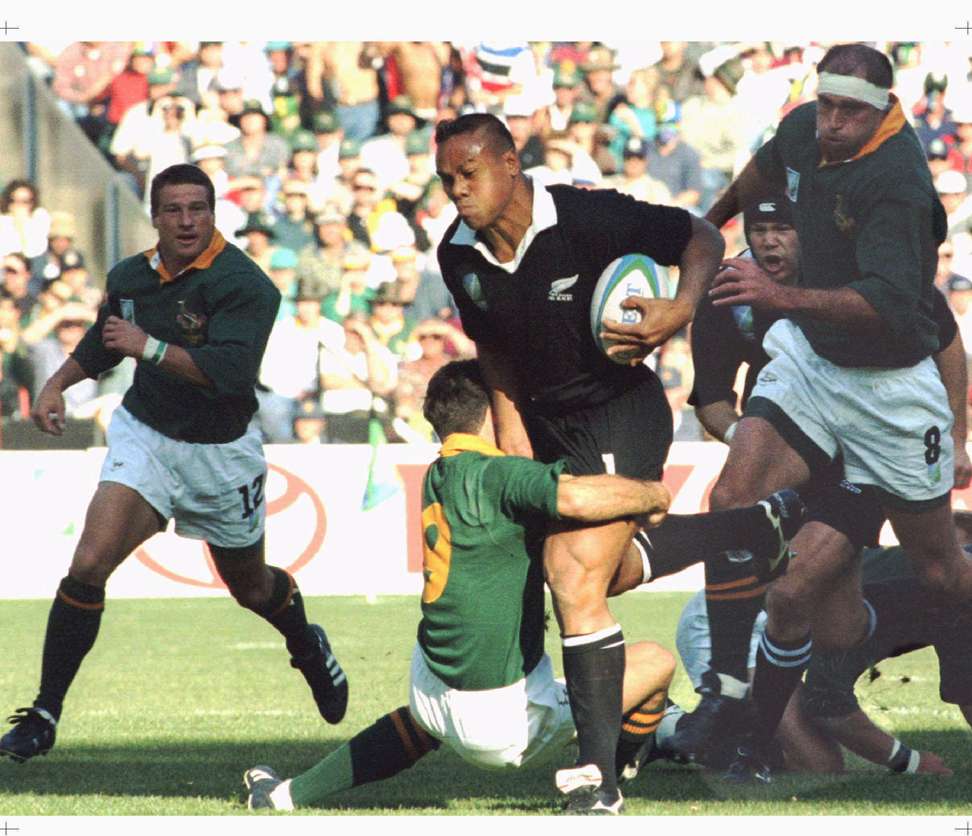
Stuart “The Moose” Krohn, former Hong Kong captain
I encountered Joost when I captained Hong Kong in the 1997 Rugby World Cup Sevens. I met him for this photo before the tournament started, and again for the coin toss before we played South Africa.
Joost was intense. No nonsense. Straight up. Just before half-time I was in a head-butting contest with Andre Venter. He was squaring up to fight when Joost said, “No, Andre.” That was the end of it. It was a great game, we scored first and lost something like 24-7.
I was very sad to hear of his battle and way too early end of life. It’s a reminder to treasure every day.
Jean de Villiers , former Springbok captain
His legacy is a big one that not only rugby players can learn from, but people from all walks of life. He had an amazing rugby career, but then made some bad choices after his playing career. Shortly after that, he was diagnosed with MND and he began his fight against the disease. The awareness he created about the disease is where his legacy lies.
Life wasn’t always smooth sailing for Joost, but he managed to get the ship on course again and showed his fighting character right till the end.
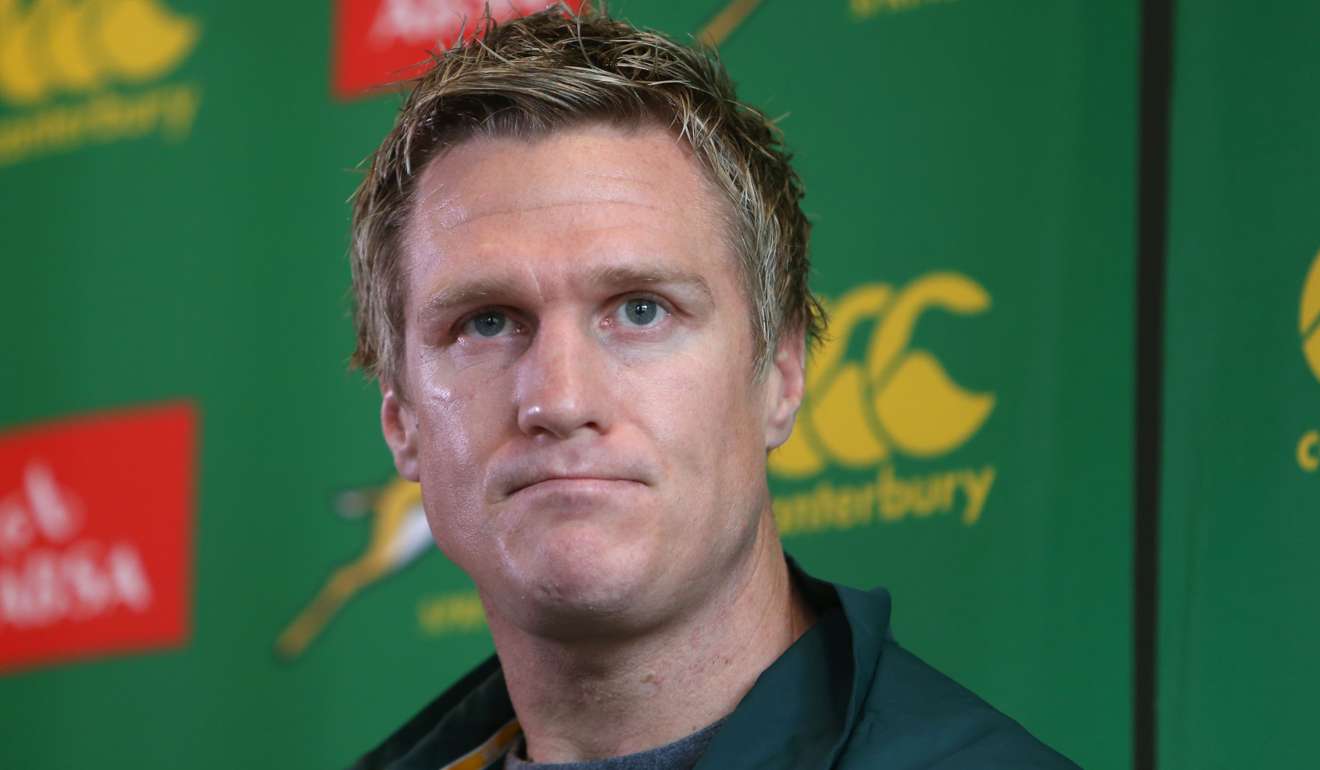
I only played one game with him, but he was a very competitive person and wanted the very best out of every player.
I’ll always remember all the amazing tries he scored, but the one moment that will always stick out is the tackle on Jonah Lomu in the 1995 World Cup final.
People will remember the many highlights of his rugby career, but I think the battle with the disease will be the lasting defining memory many will have of him.
For South Africans, he signified the fight that we all need to achieve something.
Neil de Kock, former Springbok
I will remember him as someone I tried to emulate on a weekly basis growing up as a teenager in South Africa. Others will remember him either as an unbelievable asset in their team or an unbelievable nightmare to play against.
Joost left a similar legacy both on and off the pitch. One of relentless commitment, incredible fight – even when up against the odds – and someone who could always stand tall with pride knowing he gave everything.
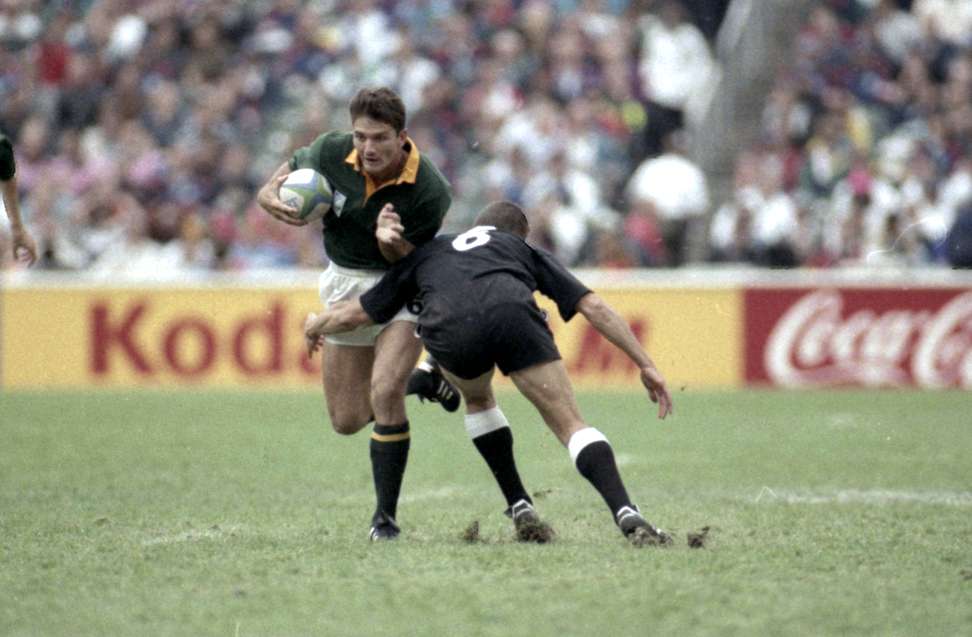
I was fortunate enough to play against him and also to serve as his understudy for the Springboks. As you would expect, he loved to win in everything, be it darts, bowls or pool. When he trained or was part of the team, the effort from everyone seemed to increase by 20 per cent, such was the influence he had on those around him.
Like everyone, I remember him for his tackle on Jonah Lomu in the 1995 World Cup final. However, I can’t forget him being a target in the Samoan game and after being on the receiving end of some horrific late hits, he continued to get up and soldier on and perform at his peak.
People all over the world will remember him as someone who continued to inspire by taking his illness head-on for so many more years than expected.
He epitomised what a Springbok should be in the pride he had for the Springbok jersey.

